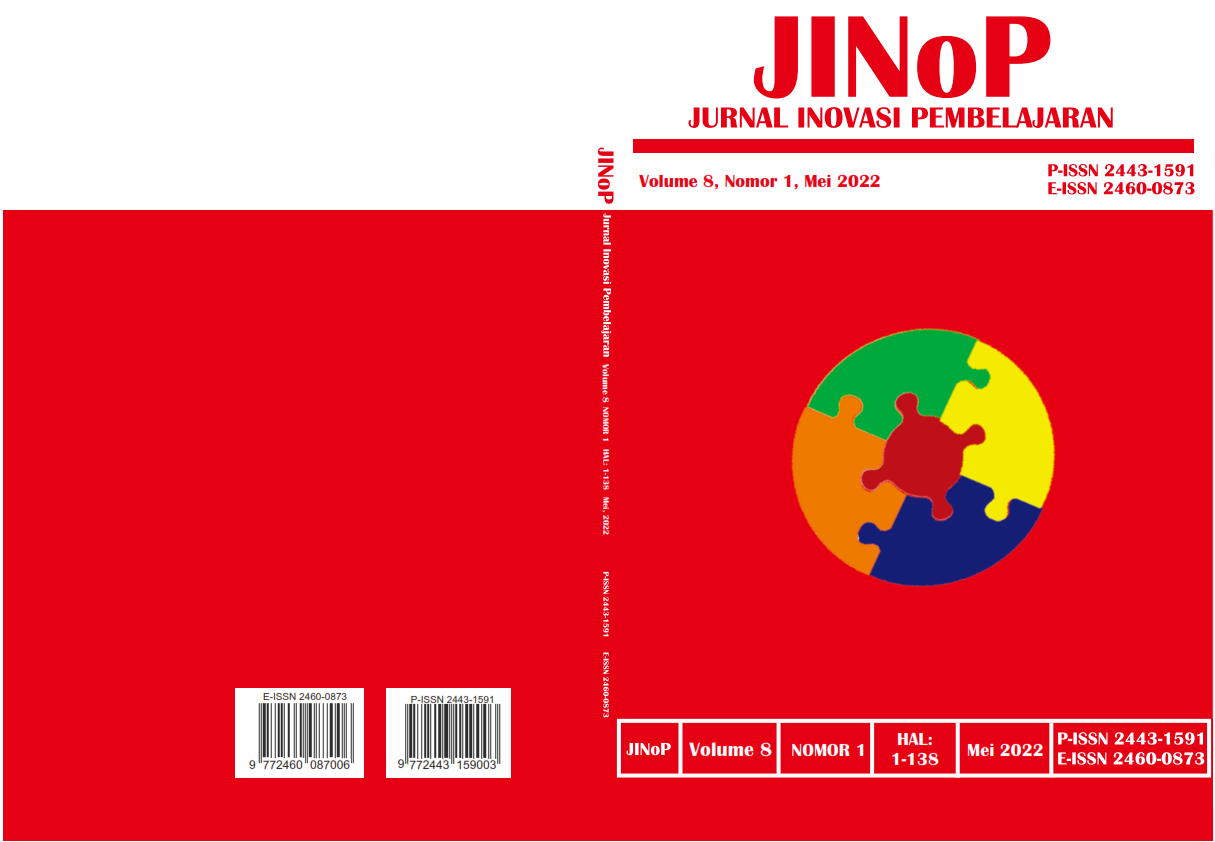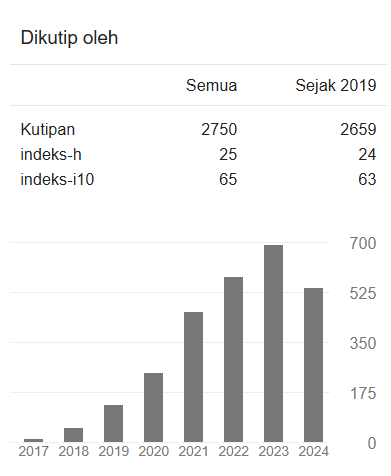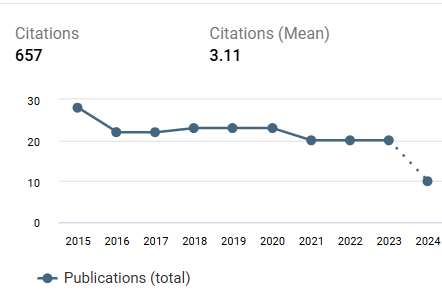Moodle, digital board dan video conference: Inovasi media pembelajaran Bahasa Inggris selama emergency remote teaching di masa pandemi Covid-19
DOI:
https://doi.org/10.22219/jinop.v8i1.18924Keywords:
Emergency Remote Teaching (ERT), LMS, LISREL, Learning InnovationAbstract
Innovation in the use of learning media amid an Emergency Remote Teaching (ERT) is indispensable, especially in teaching English as a foreign language. This study aims to document learning innovations carried out by English Lecturers and investigate students’ perspectives regarding learning innovations carried out by their classroom lecturers during ERT. Statistical quantitative and qualitative approaches were used in the research design of this study. Purposive sampling combined with questionnaires and interviews as instruments to collect data. The data were analyzed by using LISREL software supported with a descriptive qualitative approach to calculate statistical data from the questionnaire and to describe data from interviews. The findings indicate that the LMS combined with digital boards and video conference platforms have received quite a positive response from students in terms of material, self-efficacy, and usability. The innovations made by lecturers in integrating learning media can help the lecturers to maintain the achievement of learning activities during ERT.
Downloads
References
Al-Sharhan, S., Al-Hunaiyyan, A., Alhajri, R., & Al-Huwail, N. (2020). Utilization of Learning Management System (LMS) Among Instructors and Students. https://doi.org/10.1007/978-981-15-1289-6_2
Andriani, D. N., & Daroin, A. D. (2022). Analisis Faktor Keberhasilan Pembelajaran Menggunakan Learning Management System (LMS). JPE (Jurnal Pendidikan Edutama, 9(1). http://ejurnal.ikippgribojonegoro.ac.id/index.php/JPE
Atmojo, A. E. P., & Nugroho, A. (2020). EFL Classes Must Go Online! Teaching Activities and Challenges during COVID-19 Pandemic in Indonesia. Register Journal, 13(1). https://doi.org/10.18326/rgt.v13i1.49-76
Back, M., Golembeski, K., Gutiérrez, A., Macko, T., Miller, S., & Pelletier, D. ’Lanie. (2021). “We were told that the content we delivered was not as important:” disconnect and disparities in world language student teaching during COVID-19. System, 103, 102679. https://doi.org/10.1016/j.system.2021.102679
Cahyadi, A., Hendryadi, Widyastuti, S., Mufidah, V. N., & Achmadi. (2021). Emergency remote teaching evaluation of the higher education in Indonesia. Heliyon, 7(8), e07788. https://doi.org/10.1016/j.heliyon.2021.e07788
Cheung, A. (2021). Synchronous online teaching, a blessing or a curse? Insights from EFL primary students’ interaction during online English lessons. System, 100, 102566. https://doi.org/10.1016/j.system.2021.102566
Derakhshan, A., Kruk, M., Mehdizadeh, M., & Pawlak, M. (2021). Boredom in online classes in the Iranian EFL context: Sources and solutions. System, 101, 102556. https://doi.org/10.1016/j.system.2021.102556
Espino-Diaz, L., Fernandez-Caminero, G., Hernandez-Lloret, C. M., Gonzalez-Gonzalez, H., & Alvarez-Castillo, J. L. (2020). Analyzing the impact of COVID-19 on education professionals. Toward a paradigm shift: ICT and neuroeducation as a binomial of action. Sustain, 12(14), 1–10.
Fadhilah, A. R., Fitri, R. R., & Wibowo, Y. S. (2021). Distance education di masa covid-19: tinjauan terhadap sistem, kebijakan, dan tantangan e-education di sekolah. Jurnal Akuntabilitas Manajemen Pendidikan, 9(2), 171–188. https://doi.org/10.21831/jamp.v9i1.42648
Ferri, F., Grifoni, P., & Guzzo, T. (2020). Online Learning and Emergency Remote Teaching: Opportunities and Challenges in Emergency Situations. Societies, 10(4). https://doi.org/10.3390/soc10040086
Fidiantara, F., Lestari, A., Juniati, N., Syukur, A., & Jamaluddin, J. (2021). Innovation of learning methods during the covid-19 pandemic at junior high school in Mataram City and West Lombok Regency. Jurnal Pijar Mipa, 16(4), 479–485. https://doi.org/10.29303/jpm.v16i4.2749
Gillett-Swan, J. (2017). The Challenges of Online Learning: Supporting and Engaging the Isolated Learner. Journal of Learning Design, 10(1). https://doi.org/10.5204/jld.v9i3.293
Hamid, R., Sentryo, I., & Hasan, S. (2020). Online learning and its problems in the Covid-19 emergency period. Jurnal Prima Edukasia, 8(1), 86–95. https://doi.org/10.21831/jpe.v8i1.32165
Haryadi, D., & Mahmudah, F. (2021). Implementasi Kurikulum Darurat COVID-19. Journal EVALUASI, 5(2), 94. https://doi.org/10.32478/evaluasi.v5i2.595
Horvat, A., Dobrota, M., Krsmanovic, M., & Cudanov, M. (2015). Student perception of Moodle learning management system: a satisfaction and significance analysis. Interactive Learning Environments, 23(4). https://doi.org/10.1080/10494820.2013.788033
Huwaidi, F., Nandiyanto, A. B. D., & Muhammad, N. (2021). The Urgency of Online Learning Media during the Covid-19 Pandemic at the Vocational School in Indonesia. Indonesian Journal of Educational Research and Technology, 1(2), 35–40. https://doi.org/10.17509/ijert.v1i2.33368
Iglesias-Pradas, S., Hernández-García, Á., Chaparro-Peláez, J., & Prieto, J. L. (2021). Emergency remote teaching and students’ academic performance in higher education during the COVID-19 pandemic: A case study. Computers in Human Behavior, 119, 106713. https://doi.org/10.1016/j.chb.2021.106713
Khotimah, S. K. S. H. (2021). Pemanfaatan Media Pembelajaran, Inovasi di Masa Pandemi Covid-19. EDUKATIF : JURNAL ILMU PENDIDIKAN, 3(4), 2149–2158. https://doi.org/10.31004/edukatif.v3i4.857
Klimova, B. (2021). An Insight into Online Foreign Language Learning and Teaching in the Era of COVID-19 Pandemic. Procedia Computer Science, 192, 1787–1794. https://doi.org/10.1016/j.procs.2021.08.183
Lumbantobing, M. T., Samosir, A., & Tarigan, D. R. B. (2020). Tantangan pembelajaran daring selama pandemi COVID-19. Educational Journal of Elementary School, 1(2), 33–36.
MacIntyre, P. D., Gregersen, T., & Mercer, S. (2020). Language teachers’ coping strategies during the Covid-19 conversion to online teaching: Correlations with stress, wellbeing and negative emotions. System, 94(102352).
Maqableh, M., & Alia, M. (2021). Evaluation online learning of undergraduate students under lockdown amidst COVID-19 Pandemic: The online learning experience and students’ satisfaction. Children and Youth Services Review, 128. https://doi.org/10.1016/j.childyouth.2021.106160
Marini, S., & Milawati, M. (2020). Distance Learning Innovation Strategy in Indonesia During the COVID-19 Pandemic. Proceedings of the 5th Annual International Seminar on Transformative Education and Educational Leadership (AISTEEL 2020). https://doi.org/10.2991/assehr.k.201124.085
Meirovitz, T., Russak, S., & Zur, A. (2022). English as a foreign language teachers’ perceptions regarding their pedagogical-technological knowledge and its implementation in distance learning during COVID-19. Heliyon, 8(4), e09175. https://doi.org/10.1016/j.heliyon.2022.e09175
Mishra, L., Gupta, T., & Shree, A. (2020). Online teaching-learning in higher education during lockdown period of COVID-19 pandemic. International Journal of Educational Research Open, 1, 100012. https://doi.org/10.1016/j.ijedro.2020.100012
Mulyono, H., & Saskia, R. (2020). Dataset on the effects of self-confidence, motivation and anxiety on Indonesian students’ willingness to communicate in face-to-face and digital settings. Data in Brief, 31. https://doi.org/10.1016/j.dib.2020.105774
Nastiti, R., & Hayati, N. (2020). Pembelajaran Daring pada Pendidikan Tinggi: Tantangan Bagi Mahasiswa dan Dosen di Tengah Pandemi. INOBIS: Jurnal Inovasi Bisnis Dan Manajemen Indonesia, 3(3). https://doi.org/10.31842/jurnalinobis.v3i3.145
Rahmawati, P. N., & Hasanah, E. (2021). Kreativitas dan Inovasi Guru Dalam Pembuatan Materi Guru Pada Masa Pandemi. Jurnal Administrasi Pendidikan, 28(1), 113–124.
Rahmi, R. (2020). INOVASI PEMBELAJARAN DI MASA PANDEMI COVID-19. AL-TARBIYAH: Jurnal Pendidikan (The Educational Journal), 30(2). https://doi.org/10.24235/ath.v30i2.6852
Rayuwati, R. (2020). How educational technology innovates distance learning during pandemic crisis in remote areas in Indonesia? International Research Journal of Management, IT and Social Sciences, 7(6), 161–166. https://doi.org/10.21744/irjmis.v7n6.1032
Sadikin, A., & Hamidah, A. (2020). Pembelajaran Daring di Tengah Wabah Covid-19. BIODIK, 6(2). https://doi.org/10.22437/bio.v6i2.9759
Saha, A., Dutta, A., & Sifat, R. I. (2021). The mental impact of digital divide due to COVID-19 pandemic induced emergency online learning at undergraduate level: Evidence from undergraduate students from Dhaka City. Journal of Affective Disorders, 294. https://doi.org/10.1016/j.jad.2021.07.045
Shim, T. E., & Lee, S. Y. (2020). College students’ experience of emergency remote teaching due to COVID-19. Children and Youth Services Review, 119, 105578. https://doi.org/10.1016/j.childyouth.2020.105578
Succar, T., Beaver, H. A., & Lee, A. G. (2022). Impact of COVID-19 pandemic on ophthalmology medical student teaching: educational innovations, challenges, and future directions. Survey of Ophthalmology, 67(1), 217–225. https://doi.org/10.1016/j.survophthal.2021.03.011
Surahman, E., Santaria, R., & Setiawan, E. I. (2020). Tantangan pembelajaran daring di Indonesia. Kelola: Journal of Islamic Education Management, 5(2), 89–98.
Usher, M., Barak, M., & Haick, H. (2021). Online vs. on-campus higher education: Exploring innovation in students’ self-reports and students’ learning products. Thinking Skills and Creativity, 42, 100965. https://doi.org/10.1016/j.tsc.2021.100965
Vu, C.-T., Hoang, A.-D., Than, V.-Q., Nguyen, M.-T., Dinh, V.-H., Le, Q.-A. T., Le, T.-T. T., Pham, H.-H., & Nguyen, Y.-C. (2020). Dataset of Vietnamese teachers’ perspectives and perceived support during the COVID-19 pandemic. Data in Brief, 31. https://doi.org/10.1016/j.dib.2020.105788
Xhaferi, B., & Xhaferi, G. (2020). Online Learning Benefits and Challenges During the COVID 19 - Pandemic-Students’ Perspective from SEEU. SEEU Review, 15(1). https://doi.org/10.2478/seeur-2020-0006
Yu, H., Liu, P., Huang, X., & Cao, Y. (2021). Teacher Online Informal Learning as a Means to Innovative Teaching During Home Quarantine in the COVID-19 Pandemic. Frontiers in Psychology, 12. https://doi.org/10.3389/fpsyg.2021.596582
Downloads
Published
How to Cite
Issue
Section
License
Copyright (c) 2022 Septianasari

This work is licensed under a Creative Commons Attribution 4.0 International License.
Copyright Notice
Authors who publish with JINoP (Jurnal Inoasi Pembelajaran) agree to the following terms:
- For all articles published in the JINoP (Jurnal Inovasi Pembelajaran), copyright is retained by the authors. Authors give permission to the publisher to announce the work with conditions. When the manuscript is accepted for publication, the authors agree to the automatic transfer of the publishing right to the publisher.
- Authors retain copyright and grant the journal the right of first publication with the work simultaneously licensed under a Creative Commons Attribution 4.0 International License. that allows others to share the work with an acknowledgment of the work's authorship and initial publication in this journal.
- Authors are able to enter into separate, additional contractual arrangements for the non-exclusive distribution of the journal's published version of the work (e.g., post it to an institutional repository or publish it in a book), with an acknowledgment of its initial publication in this journal.
- Authors are permitted and encouraged to post their work online (e.g., in institutional repositories or on their website) prior to and during the submission process, as it can lead to productive exchanges, as well as earlier and greater citation of published work (See The Effect of Open Access).








